
Markets
What’s wrong with a command economy,
and how can we get rid of it?
Command economies are like cancer - it may seem benign at first, but it can very easily become malignant, and kill liberty in a society. On the other hand, markets have a long history of enhancing the lives of people, and improving the standards of living - so long as the government does not intervene. Planned order versus emergent order - cosmos or taxis - is the conflict. Liberty prefers the emergent order of markets - letting people do what they choose, with "spontaneous order" as the result. Capitalism is an economic system characterized by 1) sticky (private) property, and 2) free trade. Free trade means a market with no interference whatsoever by government.
Beware: Some statist writers try to contort the definition to mean fascism/corporatism, by referring to a system with even overt and massive government interfention as a "free market." E.g. Naomi Klein, in her anti-market diatribe The Shock Doctrine, refers to a US military-occupied Iraq, with checkpoints and no free movement of goods, as a "free market." One can only wonder what a controlled market would be to her.
The advantages of markets are easy enough to enumerate: the production of goods according to what people as consumers actually want - rather than what rulers on high want them to have. Markets allow amazing productivity due to the division of labor. People can buy products cheaply that would be impossible to make for themselves. The market enhances cooperation, even among people who may not know the same language or even like each other. The market offers the best practical way for all individual and social needs to be met. And the market is hyper-democracy, in that it allows and directs choices that allow people to achieve their ends without forcing other people to their will. Political "democracy" is winner-take-all with minorities getting exploited and oppressed. In a free market, each participant gets what they buy without coercing their neighbors.
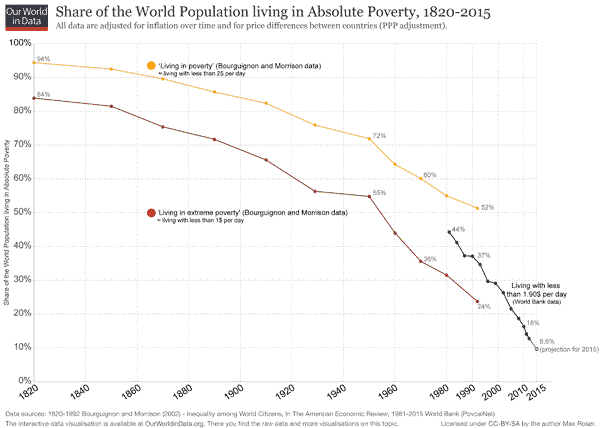
In the last few centuries libertarian capitalism has gone a long way toward eliminating poverty.
The experience of planned economies gives us ample evidence that poverty and oppression result. We have seen the command economy of the Soviet Union crumble, as free market economists predicted decades earlier. We have seen side-by-side experiments in relative market freedom - East and West Germany, North and South Korea, and Nicaragua and Costa Rica. Market exchanges are clearly a powerful way to coordinate in a decentralized fashion. Indeed, a modern economy above a certain scale may simply be intractable from a command economy perspective, due to Hayek's famous calculation problem - the fact that it takes market prices to consolidate all the local and dispersed information one must have to produce efficiently.
The knowledge of the circumstances of which we must make use never exists in concentrated or integrated form, but solely as the dispersed bits of incomplete and frequently contradictory knowledge which all the separate individuals possess." - Friedrich HayekReturning to the cancer metaphor, then, we need to create a free market economic system and culture of liberty that inoculates us from the cancer of market manipulation and control by government. This means the outright rejection of authoritarian "democratic" control and planning of the economy, and embracing freedom of trade and contract.
How does an anarchist federation use markets to sustain communities?
The fundamental opposition between central planning and free markets is indisputable. This is not an aspersion on planning as such; in fact, market relationships generally do involve planning, but the planning is done by actual participants on a voluntary basis rather the regulatory bureaucratic non-producers. Markets offer comparisons necessary to assess the performance of firms. Government agencies and monopolies have no equivalent profit and loss test. On the contrary, government failure is most often an excuse to request more tax plunder from the suffering public. Did the CIA lose money after its incompetent response to intelligence that allowed the 9/11 terrorist attacks to occur? No, their massive failure resulted in the so-called Patriot Act, giving them even more money and power. As a rule, the market rewards success and service to customers, while a command economy rewards failure and incompetence. For virtually all economic activity, markets are the simplest, most decentralized, and most effective way of insuring efficient allocations. In general, the anarchist federation model favors a straightforward approach to markets: Free them. Now.
Where are examples of free markets today?
In many areas, the United States has already captured production, and had cartelized it in favor of corporatist cronies. These areas include transportation (ICC), agriculture and drugs and medicine (FDA), banking, (Federal Reserve Bank), investment (SEC), and education (Dept. of Education.) All of these government cartel enforcement agencies should be disbanded. These social functions should be done locally and voluntarily, per our decentralization principle. It is impossible for these cartel enforcement agencies, euphemistically referred to as "regulatory agencies," to be remotely democratic. The phenomena of regulatory capture is recognized by even the most ardent statists. Their lame refrain of "it's different this time" has always proven to be a lie.
Again, we emphasize that firms can take many diverse forms. Do not disparage non-standard arrangements such as mutuals and cooperatives. Perhaps the most developed example of an economy with many cooperatives is the region of Emilia Romagna, where 8,000 co-ops (of all kinds) account for about 40 percent of the region’s GDP, and 24 percent of the population works in or belongs to the cooperative.
Since 1) markets do not require states to establish their legal and institutional preconditions - this function can be done on the market itself as Rothbard, David Friedman, and others have noted, and 2) markets are responsive to people's needs and desires, freed markets are essential to liberty.
Further reading
Murray Rothbard, Defense Services on the Free Market.
Jeffrey A. Tucker, Hayek: The Knowledge Problem
Hogeye Bill, Markets, Not Corporatism
 Intro |
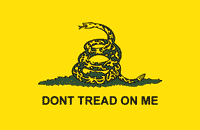 America |
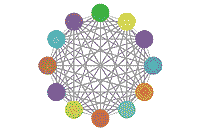 Federation |
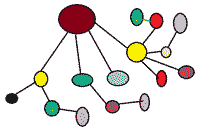 Decentralization |
 Liberty |
 Culture |
 Money |
 Markets |
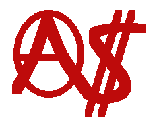 Hogeye Bill's Anarchism Page |